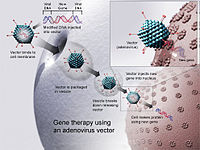
Photo from wikipedia
Leber congenital amaurosis (LCA) is a severe congenital/early-onset retinal dystrophy. Given its monogenic nature and the immunological and anatomical privileges of the eye, LCA has been particularly targeted by cutting-edge… Click to show full abstract
Leber congenital amaurosis (LCA) is a severe congenital/early-onset retinal dystrophy. Given its monogenic nature and the immunological and anatomical privileges of the eye, LCA has been particularly targeted by cutting-edge research. In this review, we describe the current management of LCA, and highlight the clinical trials that are on-going and planned. RPE65-related LCA pivotal trials, which culminated in the first Food and Drug Administration-approved and European Medicines Agency-approved ocular gene therapy, have paved the way for a new era of genetic treatments in ophthalmology. At present, multiple clinical trials are available worldwide applying different techniques, aiming to achieve better outcomes and include more genes and variants. Genetic therapy is not only implementing gene supplementation by the use of adeno-associated viral vectors, but also clustered regularly interspaced short palindromic repeats (CRISPR)-mediated gene editing and post-transcriptional regulation through antisense oligonucleotides. Pharmacological approaches intending to decrease photoreceptor degeneration by supplementing 11-cis-retinal and cell therapy’s aim to replace the retinal pigment epithelium, providing a trophic and metabolic retinal structure, are also under investigation. Furthermore, optoelectric devices and optogenetics are also an option for patients with residual visual pathway. After more than 10 years since the first patient with LCA received gene therapy, we also discuss future challenges, such as the overlap between different techniques and the long-term durability of efficacy. The next 5 years are likely to be key to whether genetic therapies will achieve their full promise, and whether stem cell/cellular therapies will break through into clinical trial evaluation.
Journal Title: British Journal of Ophthalmology
Year Published: 2021
Link to full text (if available)
Share on Social Media: Sign Up to like & get
recommendations!